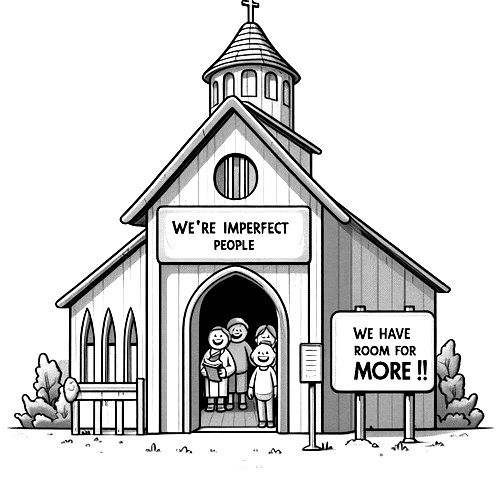Addressing the Charge: ‘The Church is Full of Hypocrites’
*Editor’s Note: This post is part of our series, ‘Satan’s Lies: Common Deceptions in the Church Today’…
“The church is full of hypocrites.” It’s an accusation we hear so often it’s almost a cliché. In fact, our critics don’t seem to get this—it’s a charge we’re happy to concede. Indeed, we’ll go further—we’re not just hypocrites, we’re far worse than our critics usually imagine.
But that’s precisely where things get interesting…
The Truth About Our Condition
Our condition runs deeper than occasional moral failures. Reformed theology calls it “total depravity”—that every aspect of our being is touched by brokenness. We’re not spiritual tourists who took a wrong turn; we’re patients in intensive care. The church isn’t a country club for the righteous; it’s a recovery ward for the sin-sick.
Why This Actually Proves Christianity’s Truth
This is precisely why Christianity rings true. What kind of religion would admit its adherents are fundamentally flawed? One that’s actually true. The Bible isn’t a highlight reel of spiritual champions; it’s a raw documentary of broken people encountering grace. David, the “man after God’s own heart,” was an adulterer and murderer. Peter, the church’s foundation, denied Christ three times. Paul, who wrote much of the New Testament, called himself the “chief of sinners.” These weren’t PR mistakes—they’re the whole point.
The Beautiful Paradox
We live in a beautiful paradox. Martin Luther captured it in Latin: simul justus et peccator— we’re simultaneously justified and sinful. We’re declared righteous through Christ while still working through our brokenness. This isn’t hypocrisy; it’s transformation in progress. We’re not claiming to have arrived; we’re admitting we desperately need the journey.
What Real Recovery Looks Like
Real recovery looks far different from what many would expect. There’s a world of difference between hypocrisy (pretending to be something we’re not) and the honest struggle of sanctification. In our congregations, you’ll find recovering addicts, reformed legalists, and rehabilitating Pharisees—all in various stages of healing. We celebrate progress while acknowledging we haven’t arrived. On any given Sunday, you’re apt to hear one of us openly confess to our ongoing battle with sin—with anger, for instance—not as a badge of honour, but as a testimony to grace’s ongoing work.
Sanctification: Our Slow But Steady Journey
None of us is where we ought to be in our journey of becoming Christ-like. But—and this is crucial—by God’s grace, we’re not where we used to be either. The Holy Spirit works in us with divine patience and wisdom, addressing one area of sin at a time. And thank God for this mercy—if He were to overwhelm us with the full awareness of all our sin at once, none of us could bear it.
Our status as WIPs—works-in-progress—isn’t a reflection on the perfect Triune God we’ve trusted in. Rather, it showcases His patient craftsmanship. Like a master sculptor, He chips away at the marble of our fallen nature, gradually revealing the image of Christ within. Sometimes the process is painful, sometimes almost imperceptible, but it’s always purposeful.
What makes this transformation possible isn’t our determination or discipline, but the unfailing faithfulness of our God. He who began this good work in us has promised to complete it. When we stumble—and we do—He doesn’t abandon us in our wretchedness. Instead, He continues His meticulous work of recreation, until He sees more and more of His own likeness reflected in His children.
An Invitation to Critics: We’ve Plenty Room to Spare
To our critics, we offer an unusual invitation: Come join us. Not because we have it all together, but precisely because we don’t. If you’re looking for perfect people, you’ll need to look elsewhere. But if you’re tired of pretending, if you’re exhausted from maintaining a facade of having it all together, there’s room for you here.
Conclusion
So what do we make of the the charge: the church is full of hypocrites? The church isn’t full of hypocrites pretending to be perfect. We’re recovering sinners who’ve found something better than the exhausting pretence of moral superiority. We’ve found grace. We’ve discovered God doesn’t demand perfection before extending acceptance. He meets us in our brokenness and begins a lifelong process of restoration.
So yes, the church’s full of hypocrites. We’re also full of former thieves, reformed gossips, folks recovering from substance abuse habits, and reforming legalists. We’re full of people who’re painfully aware of our brokenness and have found hope in a God who specialises in restoration projects. If that sounds like something you need—and let’s be honest, who doesn’t?—there’s room for one more hypocrite in recovery.
The Charge: The Church is Full of Hypocrites—Related FAQs
- If Christians are saved by grace, why do they still try to follow rules? We don’t follow God’s commands to earn salvation—that’s already secured by Christ’s work. Rather, our obedience flows from gratitude and love, like a rescued child who wants to please their adoptive father. God’s law now serves as a guide for how to live as His beloved children, not as a means of earning His favour.
- Why do Christians judge others when Jesus said ‘Judge not’? Jesus wasn’t prohibiting all judgement—He was condemning hypocritical, self-righteous judgement while ignoring our own sin. Christians are actually called to exercise careful, humble discernment within the church family, always remembering we’re fellow sinners saved by grace. The goal isn’t condemnation but restoration and health of Christ’s body.
If God is so powerful, why aren’t Christians instantly transformed when they’re saved? God’s sovereignty doesn’t mean He always works instantly—His wisdom often chooses the slow path of growth for our good. Just as a child grows gradually into maturity, God sanctifies us through a lifelong process that teaches us dependence, humility, and appreciation of His grace. This process itself glorifies Him by displaying His patient, transforming work in stubborn human hearts.
- What’s the difference between a hypocrite and someone who’s genuinely struggling with sin? A hypocrite pretends to be better than they are and hides their struggles to maintain appearance, while a genuine believer openly acknowledges their sin and actively fights against it, relying on God’s help. The key difference isn’t perfection but honesty, humility, and the direction of one’s heart. The hypocrite’s primary concern is their reputation; the believer’s is their relationship with God.
- How can you claim Christianity is true when so many church leaders have moral failures? The truth of Christianity rests on Christ’s perfection, not His followers’ performance. In fact, the Bible repeatedly warns that there will be false teachers and moral failures in the church, making such scandals a fulfillment of prophecy rather than a contradiction of Christianity’s claims. The very fact that we recognise these failures as scandalous shows Christianity’s moral standards remain compelling even when its adherents fail to meet them.
The Charge: The Church is Full of Hypocrites—Our Related Posts
Editor's Pick

Paul’s Mandate for Men: Headship Or Servant Leadership? Or Both?
Modern Christianity has fallen into a trap. We've created an either/or battle between "headship" and "servant leadership," as if these [...]

Should We Stop Using Male Pronouns for God? Why Do We Say No?
A friend of ours arrived eagerly at his first theology class in seminary. But he quickly discovered something troubling: the [...]

Did Old Testament Law Force Women to Marry their Rapists?
**Editor’s Note: This post is part of our series, ‘Satan’s Lies: Common Deceptions in the Church Today’… Viral misinformation abounds [...]

From Danvers To Nashville: Two Statements, One Biblical Vision
30 years separate the Danvers Statement on Biblical Manhood and Womanhood (1987) and the Nashville Statement on Human Sexuality (2017). [...]

The Nashville Statement: Why Affirm It Despite Media Backlash?
WHY DO REFORMED CHRISTIANS STAND BY THIS STATEMENT ON MARRIAGE AND GENDER? When the Nashville Statement was released in 2017, [...]

Who Is Belial? Solving The 2 Corinthians 6:15 Mystery
Belial: This name from the pages of Scripture chills the soul. Who is this mysterious figure Paul invokes in 2 [...]

Celibacy Or Castration: What Jesus Really Means in Matthew 19:12
One of Scripture's most shocking misinterpretations led theologian Origen to castrate himself in the third century. His tragic mistake? Taking [...]

Philippians 4:13: Did Paul Really Mean We Can Do ALL Things?
"I can do all things through Christ who strengthens me." It's on gym walls, graduation cards, and motivational posters everywhere. [...]

The Ordinary Means of Grace: Why Are They Indispensable?
ORDINARY MEANS FOR EXTRAORDINARY TRANSFORMATION What if God's most powerful work in believers' lives happens through the most ordinary activities? [...]

Is the Bible God’s Word? Or Does It Only Contain God’s Word?
The authority of Scripture stands at the crossroads of modern Christianity. While some argue the Bible merely contains God’s Word [...]
SUPPORT US:
Feel the Holy Spirit's gentle nudge to partner with us?
Donate Online:
Account Name: TRUTHS TO DIE FOR FOUNDATION
Account Number: 10243565459
Bank IFSC: IDFB0043391
Bank Name: IDFC FIRST BANK






